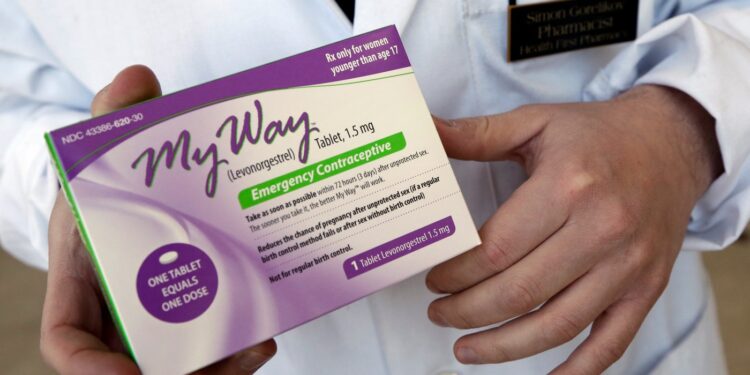
Illinois reproductive health care providers are reporting a spike in calls for abortion pills, long-acting birth control, emergency contraception and sterilization procedures following Donald Trump’s election to a second term.
Planned Parenthood of Illinois saw a 15% increase in calls immediately following the Nov. 5 election, with many callers asking about vasectomies and options for long term but reversible contraception, such as intrauterine devices and birth control implants.
“People are frightened,” said Cristina Villarreal, chief external affairs officer for Planned Parenthood of Illinois, which has 17 clinics statewide. “We are concerned about a lot of different things with the coming administration and we are doing what we can to prepare for it. But I think the important thing for patients to know right now is that we are open for providing the reproductive and sexual health care that they need … and we will fight to continue to do that.”
Since the election, Carafem’s health center in Skokie has seen a “significant rise in client demand,” with abortion care appointments nearly doubling in the past week, said Konni Lorenz, external relations and development manager. This month, the abortion provider began offering an advance provision service that allows patients to buy an additional prescription for abortion pills for future use.
“This option empowers people to avoid delays to care by having immediate access to medication if they face an unintended pregnancy in the future,” Lorenz said.
Because many patients are worried about future access to abortion, Carafem is increasing staff availability and extending health center hours “to ensure that anyone seeking abortion or contraception can receive prompt, compassionate care,” Lorenz added.
Abortion opponents have been pressing for more restrictions on abortion access once Trump takes office in January.
“Now the work begins to dismantle the pro-abortion policies of the Biden-Harris administration. President Trump’s first-term pro-life accomplishments are the baseline for his second term,” said the anti-abortion lobby the Susan B. Anthony List in a recent statement. “In the long term, GOP pro-life resolve must be strengthened and centered on the unalienable right to life for unborn children that exists under the 14th Amendment. In America, where you live should never determine whether you live.”
Trump has received widespread support among abortion opponents and frequently credited the 2022 overturning of Roe v Wade to the conservative justices he nominated to the U.S. Supreme Court. Yet the Republican seemed to soften his stance on abortion during the recent campaign, when he declined to endorse a national abortion ban, adding that the matter should be left to the states.
While it’s unclear how Trump’s second administration might curb access to reproductive health care, abortion rights advocates say they’re bracing for more barriers and challenges.
Villarreal said she’s concerned about potential restrictions on access to the abortion drug mifepristone, which is used in most medication abortions nationwide.
Although the Supreme Court preserved access to mifepristone earlier this year after a heated legal fight over the medication, anti-abortion advocates and several conservative states recently renewed a legal challenge to mifepristone in lower courts.
Villareal said some Planned Parenthood of Illinois patients are also worried about potential changes to the Affordable Care Act and its subsidized health insurance marketplaces, which Trump has repeatedly called for repealing though he hasn’t proposed a replacement.
“We are a haven state in the Midwest where patients have access to care. And even though we have a supportive government here in Illinois, we know that we will not be fully insulated from the Trump administration,” Villareal said. “But it’s impossible to predict what will happen in the future. So we have ideas and we’re preparing. And we’re ready to fight and maintain the strongest haven state possible.”
Nationwide, many health care providers have also seen a surge in demand for various forms of reproductive health care following the election.
At Wisp, an online sexual and reproductive health care company, patients have been stockpiling abortion pills and emergency contraception.
Orders for medication abortions skyrocketed 600% from Election Day on Nov. 5 to Nov. 6, said Monica Cepak, CEO of Wisp. Birth control sales were also up 50% during that period.
As of Nov. 6, emergency contraception sales went up almost 1,000%, according to Wisp. Emergency contraception, sometimes referred to as the morning-after pill, is a birth control method that can prevent pregnancy shortly after unprotected sex.
In Illinois, new emergency contraception patients were up 1,050% from Nov. 5 to Nov. 6, Cepak added.
“We know our patients are worried about their access to reproductive health care and this is made evident by the amount of patients that are stocking up on emergency contraception and birth control,” Cepak said.
The day after the election, website traffic spiked by 70% at the emergency contraception company Cadence OTC, with especially high traffic from states with more restrictive reproductive rights laws, a company spokesperson said.
The company saw a 400% increase in site visits from South Dakota and 225% from Mississippi, two states that almost entirely ban abortion; direct-to-consumer orders also spiked to five times the usual weekly volume in a single day, according to Cadence OTC.
Obstetrician-gynecologist Dr. Colleen McNicholas said two days after the election she had two patients requesting tubal ligation procedures, citing Trump’s victory.
“With the very explicit intent to do so, because as at least one patient said, there’s a fascist regime coming in and they are concerned they will no longer be able to control their own body,” said McNicholas, chief medical officer for Planned Parenthood Great Rivers, which covers southern Illinois, the St. Louis region and the Missouri Ozarks.
In the week following the election, 121 patients scheduled vasectomy appointments — a 450% increase over the weekly average the previous month, she said.
“It’s consistent with what we’ve been hearing from patients. We heard this after the first Trump election. We heard this after the fall of Roe,” she said. “Folks are concerned they won’t be able to access the health care they need.”
McNicholas added that many patients have been asking if they should change out long-acting contraception such as an intrauterine device or birth control implant, even if the expiration date isn’t quite up.
“Even if it hasn’t met its life expectancy, folks are really worried that they may not have access to it in the next four years,” she said. “So if they change it out now, that will get them a little more time.”
For example, McNicholas said one patient had been using a five-year birth control implant for just over three-and-a-half years but requested a new one.
“She knew that this method would expire; she would need replacement during the next administration,” McNicholas said. “What she’s thinking is, ‘If I get it replaced now, it will be good for another five years. That will get me through the next four years.’”
McNicholas added that patients expressed similar worries after the fall of Roe and Trump’s 2016 election.
“One of the things I think we always see in moments like this is there’s incredible confusion amongst patients who need access to health care,” she said. “What I’m always reminding folks is today you still have access to health care. So please continue to reach out. Our doors are open and they will continue to be open for as long as we can provide every service we can legally. … If you are worried about what health care looks like for you now or in the future, we’re here to help get you through that time.”
The Associated Press contributed.







